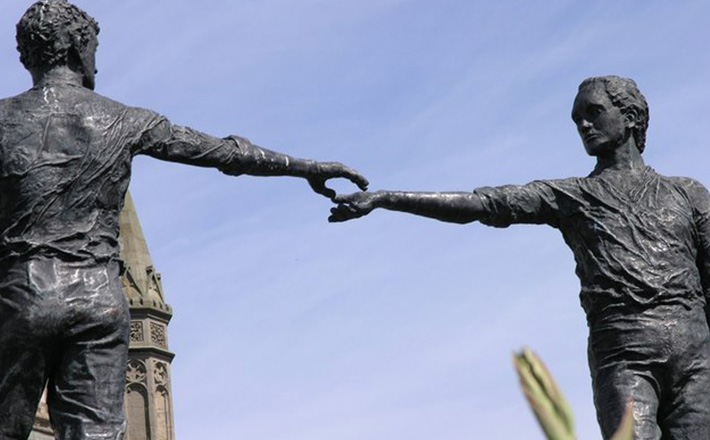Commentary on Deuteronomy 30:15-20
For a man who complains about being “slow of speech and slow of tongue” (Exod 4:10), Moses is actually a gifted orator, if this passage is any indication.
The Israelites are perched at the edge of the Promised Land listening to Moses, who has been delivering speeches for what amounts to thirty chapters. Throughout the book of Deuteronomy, he has reiterated the stipulations of the law, peppering it with frequent reminders that when they enter the land, the Israelites must not worship any other gods. These six verses provide the rousing rhetorical climax to all thirty chapters of talking. This is not a time for Moses to speak with subtlety or nuance. It is a time for stark dichotomies: life and death, blessing and curse, good and evil (Hebrew tob and ra‘, “prosperity” and “adversity” in NRSV and JPS). Service to the God of Israel yields life, service to other gods yields death. Moses has laid it all out for the Israelites, and now the choice is left to them.
Reading these six verses in isolation might give the impression that this is a one-time choice for the Israelites. But we have the good fortune of knowing how the story continues. To “choose life” in this moment does not mean to have accomplished anything or to have finished anything. Choosing life means starting something: living in a messy, difficult, and holy relationship with God. Throughout the Old Testament, the Israelites stray from the covenant, only to find God continually willing to embrace the people again, even if they also experience God’s judgment. Centuries of prophets will stand in the tradition of Moses, helping the people see that the consequences of idolatry are deadly, but that striving to live in relationship with God yields life. Covenant fidelity is not accomplished or thwarted simply through intellectual commitment or vocal assent. Covenant fidelity is a set of lived practices, an ongoing orientation toward love of God and neighbor. Moses is not asking the people simply to check off the correct box; Moses is asking them to turn their whole lives toward God.
This orientation toward God hinges on one central tenet, around which the rest of the law is organized: the LORD (that is, Yahweh, the God of Israel) is the only God the Israelites may worship. This idea is the heart of the Shema (Deut 6:4): “Hear, O Israel! The LORD is our God, the LORD alone.” It also sits atop the Ten Commandments: “I am the LORD your God who brought you out of the land of Egypt, out of the house of slavery; you shall have no other gods before me” (Deut 5:6-7 and Exod 20:2-3). The land of Canaan is occupied by people who worship other gods. As they enter it, the Israelites must be reminded over and over again to resist the desire to chase after every shiny new deity they encounter. Idolatry is alluring, but dangerous.
Idolatry manifests itself in many ways throughout the Old Testament: the worship of other deities, the worship of idols or images of Yahweh, and the worship of idols or other objects representing different deities. Prophets like Micah and Amos also describe the ways that worship practices themselves have become idols, while other requirements of the law — like justice and righteousness — have been ignored.
Idolatry also manifests itself in multiple ways in twenty-first-century Christianity. Even though we may give intellectual assent to the worship of the one true God, our practices suggest other loyalties. We make idols out of politicians or political ideologies; we chase after shiny new consumer goods; we spend hours of every day bowing toward our smartphones. Even within the church, we may act as if church buildings, particular theological tenets, or keeping the “right people” in or out is more important than the worship of God alone. Regardless of whether we view the results of these idolatrous practices as God’s curses or simply as the inevitable consequences of bad decisions, their impact on ourselves, our neighbors, and God’s creation is easily identifiable. If we serve wealth instead of God, the poor suffer. If we serve consumption instead of God, the environment suffers. If we serve pride or fear instead of God, both we and our neighbors suffer. Service of God alone must be the beacon that guides our journey through daily life, or else we face both spiritual and physical death.
After they have crossed the Jordan River, the Israelites twice will hold covenant renewal ceremonies (Josh 8:30-35 and 24:1-28), something prescribed by Moses’ earlier speeches in Deuteronomy (Deut 27:1-8). Thus, even though they have given Moses a “yes,” they require regular reminders about that choice, even regular moments of re-choosing, re-committing, re-orienting, re-turning. Weekly worship can serve a similar purpose in today’s Christian life as well: reorienting our lives in community to the service of God alone. Deuteronomy also shows a persistent concern with intergenerational memory: “You shall put these words of mine in your heart and soul, and you shall bind them as a sign on your hand, and fix them as an emblem on your forehead. Teach them to your children, talking about them when you are at home and when you are away, when you lie down and when you rise” (Deut 11:18-19). In worship — and at home — we also teach our children to choose life over idolatry. Moreover, our own choices determine the future for our children: “Choose life so that you and your descendants may live,” enjoying God’s good gifts (Deut 30:19). The way we move through the world today impacts future generations. Choosing life means practicing life, turning away from idols and turning back towards God.


February 12, 2017